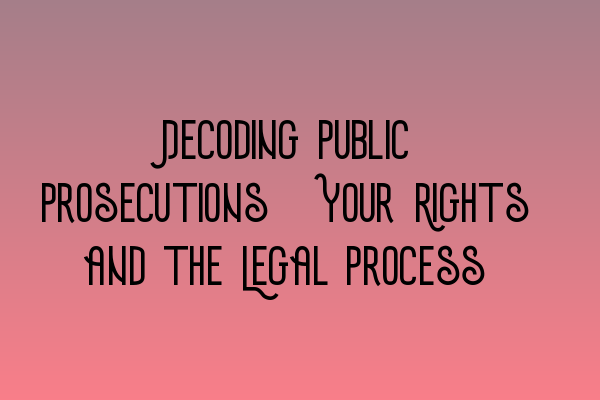Decoding Public Prosecutions: Your Rights and the Legal Process
Introduction
When facing criminal charges, understanding the legal process and your rights can be crucial in ensuring a fair trial and the protection of your interests. In this article, we will decode the realm of public prosecutions, shedding light on the various stages involved and providing an overview of your rights throughout the process. So, let’s dive in and explore this significant aspect of criminal law.
Key Stages in the Legal Process
The legal process in criminal cases typically involves several key stages that defendants need to be aware of. These stages include:
- Investigation
- Arrest and Detention
- Charging
- Bail Hearing
- Pre-trial Proceedings
- Trial
- Sentencing
- Appeal
At each stage, it is crucial to have a solid understanding of the associated procedures, your rights, and the potential implications for your case.
Investigation
The investigation stage involves gathering evidence, conducting interviews, and examining the circumstances surrounding the alleged offense. It is important to remember that during this stage, you have the right to remain silent and the right to legal representation when required. Understanding the nature of the investigation can help you protect your rights effectively.
Arrest and Detention
If the police have reasonable grounds to believe you have committed a crime, they can arrest you. Upon arrest, you will be taken to the police station for questioning. It is crucial to be aware of your rights during arrest and detention, including the right to legal representation, the right to inform a family member or friend about your arrest, and the right to have the reasons for your arrest explained to you.
Charging
Once the police complete their investigation, they may decide to charge you with a specific offense. It is essential to understand the specific charges against you and their legal implications. Seeking legal advice before making any statements or entering a plea is highly recommended.
Bail Hearing
If you are charged with an offense, you may have the opportunity to apply for bail. During the bail hearing, the court will determine whether you can be released from custody until your trial. Legal advice and representation are crucial during this stage to secure the best possible outcome for your bail application.
Pre-trial Proceedings
Pre-trial proceedings involve several important steps, such as case management conferences and disclosure of evidence. These proceedings set the stage for the trial and allow both the prosecution and the defense to prepare their cases. Understanding your rights during pre-trial proceedings can help ensure a fair and balanced legal process.
Trial
The trial is where the evidence is presented, and both sides have the opportunity to argue their case before the court. Proper legal representation and a thorough understanding of your rights during the trial are crucial for an effective defense strategy.
Sentencing
If found guilty, the court will proceed to sentencing. Depending on the nature and severity of the offense, sentencing can range from fines to imprisonment. It is important to understand the factors considered by the court during the sentencing process and the potential implications for your future.
Appeal
If you believe that an error occurred during your trial or that the sentence imposed is unfair, you have the right to appeal the decision. Understanding the grounds for appeal and the appellate process is vital in pursuing your case further.
Conclusion
Decoding the process of public prosecutions and understanding your rights can significantly impact the outcome of your criminal case. By being aware of the key stages involved and seeking legal advice at every step, you can navigate the legal system more effectively and protect your interests. Remember to exercise your right to legal representation and stay informed about the latest developments in criminal law.
For more information and resources on criminal law, please visit the following related articles:
